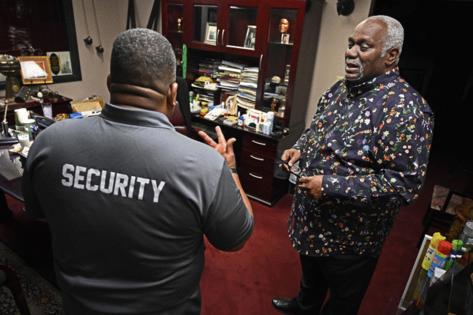'I carry, and I don't care who knows it:' Pastors pack heat in wake of church shootings
Published in Religious News
BALTIMORE — The Rev. Rodney Hudson has had enough scary confrontations in and around his churches that he has taken safety measures many would consider extreme.
There was the day he was giving the eulogy at a funeral and the son of the deceased rose to attack him in the pulpit. And another day, when two men mugged him in the church parking lot.
It was more than enough to convince the West Baltimore minister he should carry a gun and have a uniformed armed guard present for all church activities to keep himself and his flock safe.
“I carry and I don’t care who knows it,” said Hudson, the pastor of Ames Memorial Church in Sandtown-Winchester and Metropolitan United Methodist Church in Harlem Park. “It’s sad to say — we all believe in God as our protector, but the other harsh reality is that there are so many people who have absolutely no respect for God and the church nowadays.”
Hudson shared the memories and his philosophies on security against a backdrop of shockingly violent acts against churches in recent weeks. One evangelical think tank, the Family Research Council, identified 1,384 acts of hostility, including violence, theft, or arson, toward churches in the U.S. between January 2018 and December 2024.
Several have taken place in Baltimore. They include the nonfatal shooting by a pastor of an intruder at an abandoned church in Union Square and the fatal shooting of a man in front of Adams Chapel AME Church in Northwest Baltimore, both in 2024, and the slaying of a beloved congregant on the grounds of Southern Baptist Church in East Baltimore in 2021.
But the gruesome and targeted incidents of the past few weeks have further raised alarms.
A shooter attacked a Mass at a Catholic school in Minnesota in August, killing two children and wounding 26. A disaffected military veteran drove his truck into a Mormon church in Michigan last month, ignited a blaze, and opened fire on the congregation, leaving at least four dead.
Police prevented what could have been another massacre by arresting a man on Oct. 5 who had planted more than 200 destructive devices in a tent he’d set up in front of the Cathedral of St. Mary the Apostle in Washington.
“These were tragic, tragic incidents,” said Greg Farno, the chancellor of education for the Archdiocese of Baltimore, whose job includes overseeing security for about 60 Catholic schools in Maryland. “Clearly, security at our schools is a high, high priority. They’ve only caused us to make our protocols even stronger.”
The Rev. Dr. Harold A. Carter Jr. said it’s shocking, if not totally surprising, that some unstable individuals have chosen to vent their ire at churches.
The pastor of New Shiloh Baptist Church in West Baltimore cited some of the motives behind the violence on the harsh nature of modern political discourse, the rise of extreme ideologies, and the apparent increase in drug and mental health issues in the U.S.
“Spiritual warfare is a major variable in the equation,” said Carter, a third-generation Baltimore preacher. “We are engaged in a spiritual battle. But people under stress tend to take out their frustrations on religious or faith-based institutions. They stand for something, unlike neighborhoods, community centers, or malls. It becomes simpler and easier to turn one’s frustrations and anger against the church.”
No one knows how many Christian leaders go as far as Hudson by carrying a licensed firearm even in the pulpits; however, it’s clear that pastors make it their business to ensure that other forms of armed protection are in place.
Lifeway Research, a nonprofit evangelical research company in Nashville, Tennessee, found in a 2023 survey that more than half of Christian congregations in the country — 54% — have armed church members on site when congregants are present. An overwhelming majority have law enforcement or military backgrounds.
More than three-fourths of larger American congregations — those with 250 or more members — said they had such armed volunteer teams in place. Twenty-seven percent of those hired were uniformed officers. Nearly 75% had intentional plans for active shooters in place.
As a “free person of faith” who believes that “God is going to take care of me and my family,” Carter said he doesn’t feel the need to arm himself. But he considers it his sacred obligation to make sure his flock is protected.
New Shiloh employs a range of methods to make that happen.
The 5,000-plus-member church took a less vigilant approach to security measures up until about 10 years ago, when Carter and others became concerned that violent incidents were becoming more commonplace.
The congregation now pays a handful of security officers and works with a team of trained volunteers to provide armed protection at every activity, from Sunday morning services to midweek Bible study classes.
Carter said most congregants enjoy the sense of security they provide.
The church has long had surveillance cameras in place, and it has added upgrades and more units over the past two years, with the security team closely monitoring the scene.
“For churches of our size, it’s common; it’s of necessity,” Carter said.
For his part, Hudson, a former U.S. Army paratrooper, acknowledges that many pastors, if not most, would frown on his decision to carry a .38 special. But he points to the Book of Acts, which urges church leaders to “be on guard for yourselves and all the flock.”
But Ames and Metropolitan churches can only afford that one uniformed officer.
“If they get past him, I’m the second guard,” Hudson said. “The pastor almost has to be a security guard.”
©2025 Baltimore Sun. Visit baltimoresun.com. Distributed by Tribune Content Agency, LLC.









Comments